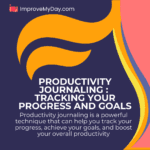What is Decision Fatigue?
Decision fatigue is the mental exhaustion that results from making numerous decisions throughout the day. It’s like a cognitive version of muscle fatigue – the more decisions you make, the harder each subsequent choice becomes.
According to Dr. Roy Baumeister, a renowned psychologist and leading researcher in the field of willpower, “Making decisions uses the very same willpower that you use to say no to doughnuts, drugs, or illicit sex.” This means that every decision you make, no matter how small, chips away at your mental energy.
Signs of Decision Fatigue
How do you know if you’re experiencing decision fatigue? Look out for these common signs:
- Procrastination on important tasks
- Impulsive decision-making
- Avoiding making decisions altogether
- Feeling overwhelmed by simple choices
- Increased irritability or frustration
The Impact of Decision Fatigue on Productivity
Decision fatigue can have a significant negative impact on your productivity. When your mental resources are depleted, you’re more likely to:
- Make poor choices or take shortcuts
- Struggle with creative problem-solving
- Experience decreased willpower and self-control
- Have difficulty focusing on important tasks
These effects can lead to a vicious cycle where decreased productivity leads to more stress, which in turn exacerbates decision fatigue.
5 Effective Strategies for Overcoming Decision Fatigue
Now that we understand the problem, let’s dive into some practical strategies for overcoming decision fatigue and boosting your productivity.
1. Simplify Daily Choices
One of the most effective ways to combat decision fatigue is to reduce the number of decisions you need to make each day. Here are some tips:
- Streamline your wardrobe: Choose a “uniform” or create a capsule wardrobe to minimize daily outfit decisions.
- Plan meals in advance: Meal prep or use a meal planning app to avoid last-minute food decisions.
- Automate recurring decisions: Set up automatic bill payments or use subscription services for regular purchases.
2. Prioritize Important Decisions
Not all decisions are created equal. By prioritizing your most important choices, you can ensure you’re using your mental energy wisely.
- Use the Eisenhower Matrix to categorize decisions based on urgency and importance.
- Schedule important decisions for times when you’re typically most alert and focused.
- Delegate or eliminate low-impact decisions whenever possible.
3. Establish Routines
Routines can help reduce decision fatigue by turning recurring choices into habits. Consider creating routines for:
- Morning and evening activities
- Work tasks and processes
- Exercise and self-care
By automating these aspects of your life, you’ll free up mental energy for more important decisions.
4. Use Decision-Making Frameworks
When faced with complex decisions, using a framework can help streamline the process and reduce mental strain. Try these techniques:
- The 10/10/10 Rule: Consider how you’ll feel about the decision in 10 minutes, 10 months, and 10 years.
- The Two-Minute Rule: If a task takes less than two minutes, do it immediately rather than deciding when to do it later.
- The WRAP Method: Widen your options, Reality-test your assumptions, Attain distance before deciding, and Prepare to be wrong.
5. Practice Self-Care
Taking care of your physical and mental health is crucial for maintaining your decision-making capacity. Incorporate these self-care practices:
- Get adequate sleep (7-9 hours per night for most adults)
- Exercise regularly to boost cognitive function
- Practice mindfulness or meditation to reduce stress
- Take regular breaks throughout the day to recharge
Long-term Benefits of Managing Decision Fatigue
By implementing these strategies to overcome decision fatigue, you’ll likely experience several long-term benefits:
- Increased productivity: With more mental energy available, you’ll be able to tackle tasks more efficiently.
- Improved decision quality: By reserving your cognitive resources for important choices, you’re more likely to make better decisions.
- Reduced stress: Simplifying your decision-making process can lead to less overall stress and anxiety.
- Enhanced creativity: With a clearer mind, you may find it easier to generate innovative ideas and solutions.
- Better work-life balance: By streamlining decisions in both personal and professional spheres, you can create more time for what truly matters to you.
Conclusion
Overcoming decision fatigue is a critical step towards improving your productivity and overall quality of life. By implementing the strategies outlined in this article – simplifying daily choices, prioritizing important decisions, establishing routines, using decision-making frameworks, and practicing self-care – you can significantly reduce the mental drain associated with constant decision-making.
Remember, the goal isn’t to eliminate decisions altogether, but to manage them more effectively. Start small by incorporating one or two of these strategies into your daily life, and gradually build up to a more comprehensive approach to managing decision fatigue.
By taking control of your decision-making process, you’ll not only boost your productivity but also pave the way for a more balanced, fulfilling life. So why wait? Start making better decisions about your decisions today!



